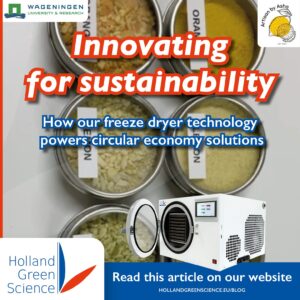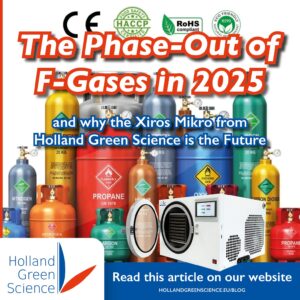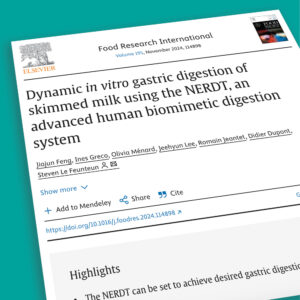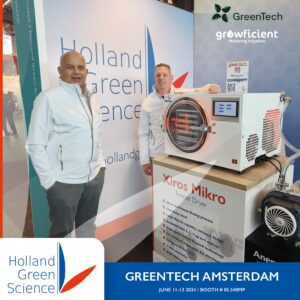The Phase-Out of F-Gases in 2025: Why the Xiros Mikro from Holland Green Science is the Future
As of 1 January 2025, a significant change in European regulations has come into effect: the sale of appliances containing F-gases with a Global Warming Potential (GWP) of 2500 or higher is banned. This marks a major shift in cooling and drying technology, presenting challenges for manufacturers and consumers alike. While many manufacturers still rely on outdated refrigerants, Holland Green Science has been leading the way from the beginning with the Xiros Mikro, which exclusively uses the environmentally friendly R290 refrigerant.
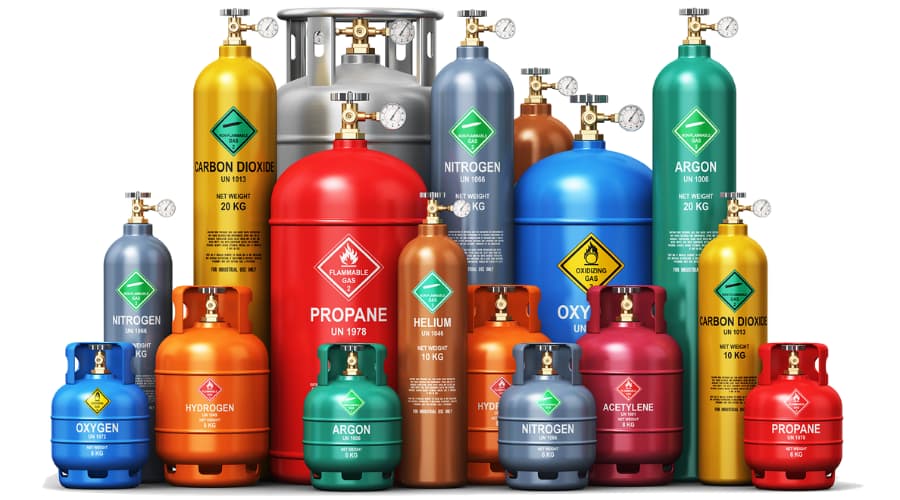
What Are F-Gases and Why Are They Being Phased Out?
F-gases, or fluorinated greenhouse gases, are widely used in refrigeration and freezing equipment due to their high cooling efficiency. However, due to their high GWP, they significantly contribute to global warming and negatively impact the environment. With the upcoming new regulations, the use of these harmful gases is being increasingly restricted, and from 1 January 2025, the sale of appliances still relying on them will no longer be permitted in the EU.
Cheaper, consumer-market freeze dryers remain a problem. The GWP value is a comparative measurement that illustrates the greenhouse effect potential of various greenhouse gases, particularly refrigerants, if released into the environment. Many of these so-called “hobby freeze dryers,†imported from countries such as the United States, still use these banned refrigerants. As a result, they will no longer be available for sale in Europe and, in many cases, will not even be serviceable anymore.
What are F-Gases?
F-Gases, or fluorinated gases, are a group of synthetic greenhouse gases widely used in various applications, including refrigeration, freeze drying and air conditioning. These gases are known for their high global warming potential (GWP), which means they can trap heat in the atmosphere much more effectively than carbon dioxide. This makes them significant contributors to global warming. F-Gases include hydrofluorocarbons (HFCs), perfluorocarbons (PFCs), and sulfur hexafluoride (SF6), each used for different purposes but all sharing the common trait of being potent greenhouse gases.
History and Impact of F-Gases
F-Gases were introduced in the 1990s as replacements for ozone-depleting substances (ODS) like chlorofluorocarbons (CFCs) and hydrochlorofluorocarbons (HCFCs). While they helped mitigate the issue of ozone layer depletion, their high GWPs have made them a significant environmental concern. Over the years, the production and consumption of F-Gases have surged, leading to a notable increase in their emissions. According to the Intergovernmental Panel on Climate Change (IPCC), F-Gases are responsible for about 2% of global greenhouse gas emissions, underscoring their substantial impact on climate change.
National Regulations and Phase-Down
In response to the growing concern over F-Gases, many countries have implemented regulations to phase down their production and consumption. The European Union, for instance, has enacted the F-Gas Regulation, aiming to reduce HFC emissions by 79% by 2030 compared to 2015 levels. Similarly, the United States has introduced the American Innovation and Manufacturing (AIM) Act, targeting an 85% reduction in HFC emissions by 2036 compared to 2011-2013 levels. Other countries, including Japan and Australia, have also adopted similar regulations to curb the use of these high-GWP gases. These national regulations are crucial steps towards mitigating the climate impact of F-Gases.
Holland Green Science and the Xiros Mikro: A Sustainable Alternative
While many manufacturers are now scrambling to find alternatives, Holland Green Science made the forward-thinking decision years ago to adopt a future-proof solution with low global warming potential. The Xiros Mikro exclusively uses R290 (propane), a natural refrigerant with an extremely low Global Warming Potential (just 3). This makes the machine not only environmentally friendly but also more efficient and durable freeze dryer on the market.
At Holland Green Science, it’s not just about the machine but about the future of food and product preservation. The Xiros Mikro allows users to freeze dry products in a sustainable, cost-effective, and high-quality manner. This means that professionals and innovators who invest in the Xiros Mikro are assured of an appliance that not only complies with current regulations but is also built for the future.
The Problem with Hobby Freeze Dryers: Not Sustainable, High Global Warming Potential
Low-cost freeze dryers, often positioned as hobbyist devices, remain an issue in the market. Not only do they still use banned F-gases, but they also frequently lack CE certification, a crucial requirement for sales and usage within the EU. This means these appliances are not safe and do not meet European standards for sustainability, energy efficiency, and user safety.
Refrigerant Reclamation and Disposal
Proper management of used refrigerants is a critical component of F-Gas regulation. Refrigerant reclamation involves recovering and recycling used refrigerants, which helps reduce the demand for new refrigerants and minimizes emissions. On the other hand, refrigerant disposal ensures the safe destruction of used refrigerants to prevent their release into the atmosphere. Many countries have established regulations and guidelines for these processes, emphasizing the use of certified technicians and appropriate equipment.
In the United States, the Environmental Protection Agency (EPA) mandates that used refrigerants be processed by certified reclaimers. The EPA also provides guidelines for the safe handling and disposal of refrigerants, including the use of personal protective equipment and proper labeling of refrigerant containers. Similarly, the European Unions F-Gas Regulation requires the recovery and recycling of used refrigerants, ensuring they are either reused or destroyed in an environmentally friendly manner. These measures are essential for reducing the environmental impact of refrigerants and ensuring compliance with national regulations.
What Do National Regulations Mean for the Future?
With the enforcement of F-gas regulations in 2025, hobby freeze dryers and other appliances using these outdated refrigerants will become doubly illegal: they can no longer be sold, and they fail to meet safety standards in Europe.
For consumers and businesses looking to invest in a reliable, future-proof solution, the choice is clear. By choosing the Xiros Mikro freeze dryer, they are opting not only for compliance with regulations but also for a product that delivers optimal performance for years without a large ecological footprint.
The Advantages of the Xiros Mikro at a Glance: Low Climate Impact
- Uses R290 (propane), an environmentally friendly refrigerant with a GWP of only 3.
- More energy-efficient and effective than traditional freeze dryers.
- Fully CE-certified and compliant with European regulations.
- An investment in the future of sustainable food and product preservation technology.
- Free from the restrictions and bans affecting outdated appliances.
- The refrigerant’s climate impact is assessed relative to the same mass of carbon dioxide, ensuring a lower environmental footprint.

Conclusion
The upcoming legislation marks the end of appliances relying on unsustainable F-gases and the beginning of a new era where eco-friendly alternatives become the standard. Holland Green Science has long embraced this vision, with the Xiros Mikro standing as a model of innovation, sustainability, and reliability.
For those serious about food and product preservation, the Xiros Mikro is not just a choice but a necessity. This is not just a machine but an investment in the future. From 1 January 2025, there will be no room for outdated technologies. Choose progress, choose sustainability, choose Xiros Mikro.
Want to learn more about the advantages of the Xiros Mikro and how it can transform your drying process? Contact Holland Green Science and discover how you can take your product preservation to the next level.
More information you can find on the websites linked below:
https://climate.ec.europa.eu/eu-action/fluorinated-greenhouse-gases/about-f-gases_en
https://climate.ec.europa.eu/eu-action/fluorinated-greenhouse-gases/eu-rules_en



